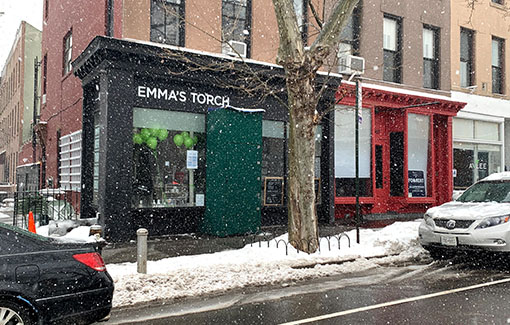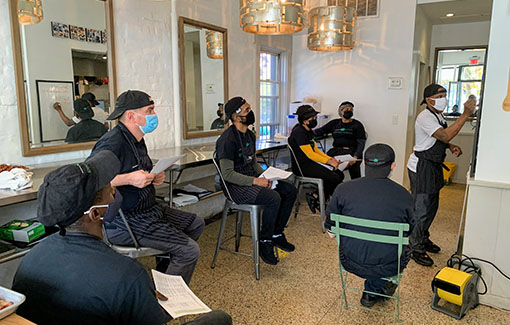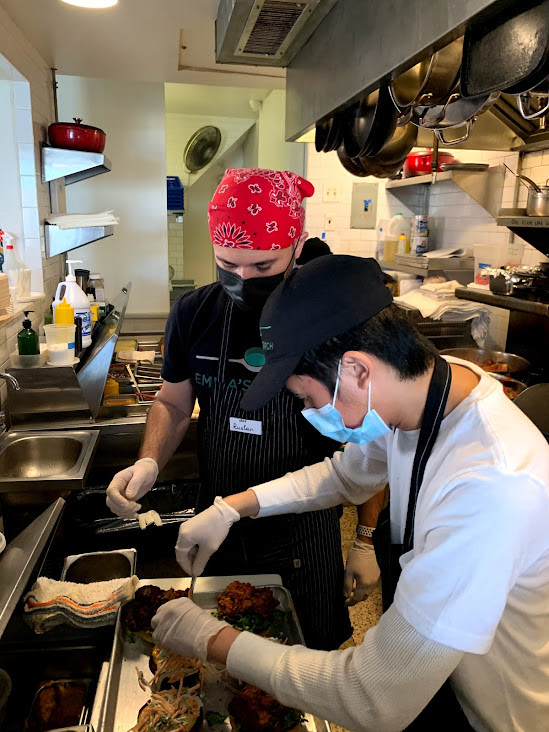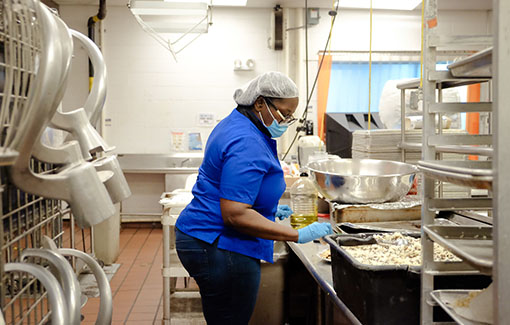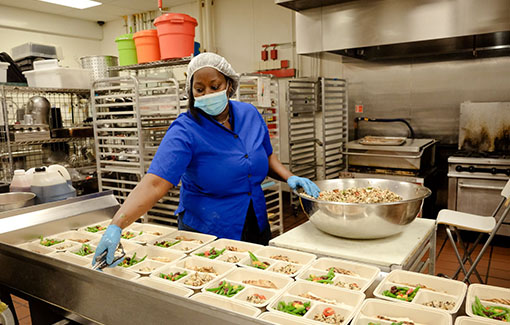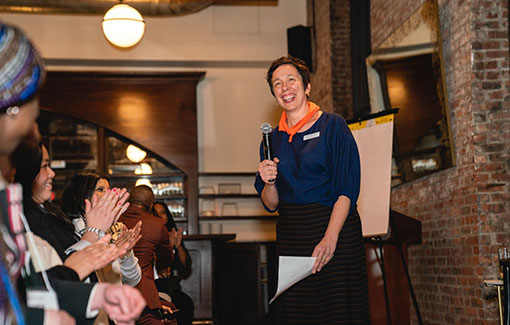Early on, as New York City grappled with the pandemic and a shutdown that stifled the foodservice industry, caused enormous job losses, and exacerbated a hunger crisis for vulnerable New Yorkers, two Mizuho USA Foundation grantees stepped up to the plate and, through innovative business models, leveraged relatively small investments to have an exponential impact on food insecurity and economic opportunities for the underserved.
“It’s been a roller coaster,” says Kerry Brodie, Founder & Executive Director of Emma’s Torch, when talking about her experience the past 20 months leading a nonprofit dedicated to empowering refugees through culinary education. “Our restaurant had not been open even two years and we had to lay off 100 percent of our staff and halt training.”
The organization, whose name is a nod to Emma Lazarus’ sonnet on the Statue of Liberty, lights a pathway to independence and autonomy for refugees, asylees, and survivors of human trafficking through workforce training at its restaurant in Carroll Gardens, Brooklyn, and café in the Brooklyn Public Library. Kerry and her team strove to keep this mission moving forward against the backdrop of the pandemic, a rising tide of anger toward immigrants, and concerns over how unemployment benefits could impact immigration status. In the first three months of the pandemic, more than 50 percent of its graduates lost their jobs. To help keep its dream alive, the organization pivoted quickly from in-person kitchen training to offering virtual classes and remote mentoring. It was also able to create direct access to emergency relief funds for its students totaling more than $75,000.
Hot Bread Kitchen (HBK) offers bakery training and a culinary business incubator, serving a large community of women, over 70% of whom are immigrants and many of whom serve as sole breadwinners for their families. Karen Bornarth, VP of Industry Partnerships & Initiatives, said “When the pandemic began, more than 40% of our workforce program graduates immediately lost their jobs. A majority of our members did not have any source of income during the shutdown and over one-third of the small businesses in our community saw more than a 50% decrease in revenue. Our staff was in touch weekly with members of both our workforce and incubator programs, offering support in the form of coaching, virtual training, individualized business advising, and direct cash assistance.”
Hot Bread Kitchen suspended its program operations and activated its Emergency Response Fund, providing over $260,000 in cash assistance directly to 177 workforce and small business members. “While our job placement efforts never stopped, our culinary training was on pause for over a year,” said Karen. “We were thrilled to relaunch it with a new incoming class this summer.” During the pandemic HBK also launched a new facility management training program, which has prepared nearly two dozen women for careers in a field that offers high wages and opportunities for growth.
While both organizations’ missions reflect a long-term commitment to the economic security and resiliency of their communities, they also quickly adapted their operations to meet the immediate needs of food insecure members of their neighborhoods. Emma’s Torch partnered with Rethink and engaged its students in preparing and distributing more than 18,000 meals, while HBK created its Chef Collective, connecting small, minority-owned catering businesses to meal assistance programs in Harlem, regenerating sales for the businesses and combating food insecurity and providing over 16,000 meals for the community since December 2020. The Mizuho USA Foundation has provided grants to both organizations for their innovative efforts to offer crucial support to their clients and local communities during the pandemic crisis.
“Our organizations have supported each other for years, and we were in contact throughout the pandemic, sharing how to how maximize assistance to our students and communities as well as how to collaborate and get through this together,” said Kerry. HBK served as an incubator for Emma’s Torch. Back in 2016, Kerry was enrolled in HBK’s Mizuho-supported Prep for Success Program, which gave her resources to develop her social enterprise business plan. “Kerry and Hot Bread Kitchen have always been thought and learning partners,” said Karen. “We are looking forward to formalizing more collaboration and partnerships with Emma’s Torch in our programs, from joint recruitment strategies, sharing curriculum, and providing wrap-around support services.”
Both organizations are drawing upon new strengths and knowledge resulting from the pandemic, and setting forth bolder visions for growth and impact for the future. “Emma’s Torch is reopening our flagship restaurant and library café,” said Kerry. “We will also continue our advocacy in support of government efforts to revitalize the restaurant industry. The stress of the pandemic revealed cracks in the food service industry, especially when it comes to pay. That needs to be fixed.”
“We are committed to significantly increasing the number of workers we reach through partnerships and geographic expansion, said Karen. “Over the next three years we will target community-based organizations, city agencies and employers to build out a collaborative Good Food Jobs framework, while connecting immigrant-led businesses to new markets so their services can become viable sources of income and the best possible outcomes for our members.”
Mizuho is proud to have been a partner to both of these organizations over the years, providing Mizuho USA Foundation grants and the assistance of enthusiastic Mizuho volunteers.
